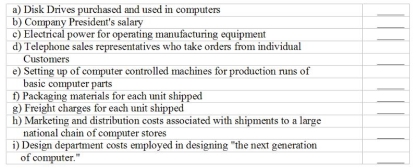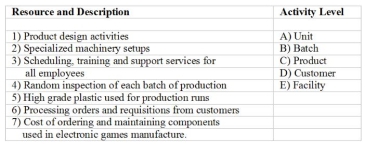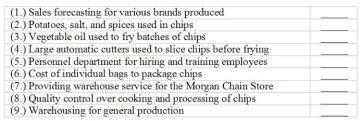Exam 4: Activity-Based Costing Systems
Exam 1: Cost Management and Strategic Decision Making Evaluating Opportunities and Leading Change75 Questions
Exam 2: Product Costing Systems: Concepts and Design Issues117 Questions
Exam 3: Cost Accumulation for Job-Shop and Batch Production Operations90 Questions
Exam 4: Activity-Based Costing Systems102 Questions
Exam 5: Activity-Based Management89 Questions
Exam 6: Managing Customer Profitability73 Questions
Exam 7: Managing Quality and Time to Create Value114 Questions
Exam 8: Process-Costing Systems110 Questions
Exam 9: Joint-Process Costing90 Questions
Exam 10: Managing and Allocating Support-Service Costs80 Questions
Exam 11: Cost Estimation90 Questions
Exam 12: Financial and Cost-Volume-Profit Models69 Questions
Exam 13: Cost Management and Decision Making70 Questions
Exam 14: Strategic Issues in Making Long-Term Capital Investment Decisions97 Questions
Exam 15: Budgeting and Financial Planning81 Questions
Exam 16: Standard Costing, Variance Analysis, and Kaizen Costing80 Questions
Exam 17: Flexible Budgets, Overhead Cost Management, and Activity-Based Budgeting97 Questions
Exam 18: Organizational Design, Responsibility Accounting, and Evaluation of Divisional Performance80 Questions
Exam 19: Transfer Pricing76 Questions
Exam 20: Performance Measurement Systems Glossary Photo Credits81 Questions
Select questions type
Assume the role of Belinda Taylor. Think of the concerns raised by the different individuals at the meeting and address each of them. Do you think there is a role in this for an outside consultant? Explain
Popular Toy Company (PTC. grew out of a family business that the Neville family owned and ran from the basement of a large house. PTC currently manufactures over 50 types of plastic toys for various age groups. Belinda Taylor, the controller of PTC, has been concerned about the archaic costing system existing within the company. She approached Joan Neville, the president, to express her concern
Joan listened patiently to Taylor and decided to call a meeting. Taylor suggested that the production and marketing personnel also should be part of the meeting
The following people were invited: John Baxter (general manager), Rita MacDonald (marketing manager) and Peter Lindsay (production supervisor)
The meeting began with Taylor thanking everyone for their time and explaining to them the reason for calling the meeting
Taylor: Thank you all for coming to this meeting at such short notice. As you all know, our competition is getting tougher each day. It is important that we take steps to confront the situation.
Lindsay: I don't see the problem. My men and machines are constantly busy, so we must be doing well
MacDonald: We don't have to panic yet but there are signs that we should think about our future; competition is closing in on us. For example, of late, we have not been getting orders for the more profitable products
Baxter: Our men and machines are busy, but this is no good if all we do is produce and stock the goods in our warehouse. Therefore, I agree with Belinda that we should get our minds together and think about our future
Neville: Where do we begin?
Taylor: I think we should begin with our costing system. In particular, we should implement an activity-based costing system.
Neville: That's easy. Belinda, why don't you call a consultant and have them do the job
Taylor: I don't think that we should hire a consultant. Instead, we should do it ourselves as it will be a valuable learning exercise. We should start with an activity analysis by listing all the activities conducted in our company and all the resources consumed by these activities MacDonald: That sounds complicated. How do you propose to go about this?
Taylor: We would have to get everybody's input regarding what they do
Lindsay: I don't think there is a need to talk to my men. I can tell you all that they do
Baxter: I agree with Peter. There's no need to talk to the boys. They should not
be disturbed from their work. Besides, they may hide certain activities. You may not get an accurate picture from them
Required:
(Essay)
4.8/5  (53)
(53)
The review of each tax return by H & R Block would be an example of:
(Multiple Choice)
4.9/5  (38)
(38)
Which of the following statements regarding traditional cost accounting systems is False?
(Multiple Choice)
4.8/5  (31)
(31)
Use the following to answer questions:
The Dedham Cooperative Bank is considering either a bank wide overhead rate or departmental overhead rates to allocate $2,000,000 of indirect costs. The bank wide rate would be based on either direct labor hours or the number of loans processed. The departmental rates would be based on direct labor time for Consumer Loans and a dual rate based on direct labor time and the number of loans processed for
Commercial Loans. The following information was gathered for the upcoming period:
 -Management estimates that it now costs $2,000 to analyze and close a commercial loan. This amount has been included in the $2,000,000 of indirect costs. If the remaining indirect costs are allocated based on the number of loans processed, how much of the indirect costs should be allocated to the Consumer Department?
-Management estimates that it now costs $2,000 to analyze and close a commercial loan. This amount has been included in the $2,000,000 of indirect costs. If the remaining indirect costs are allocated based on the number of loans processed, how much of the indirect costs should be allocated to the Consumer Department?
(Multiple Choice)
4.9/5  (35)
(35)
Lucy Cook, CPA, J.D., provides accounting and tax and legal services to her clients. In 2007, she charged $175 per hour for accounting and $200 per hour for tax and legal services. Erin estimates the following
 costs for the year 2008.
Operating profits declined last year and Ms. Cook has decided to use activity based costing ABC. procedures to evaluate her hourly fees. She has gathered the following information from last year's
costs for the year 2008.
Operating profits declined last year and Ms. Cook has decided to use activity based costing ABC. procedures to evaluate her hourly fees. She has gathered the following information from last year's
 records:
Required:
(a) What is the total cost allocated to Accounting services using Activity-Based costing ABC.?
(b) Lucy wants her hourly fees for the tax and legal services to be 200% of their activity-based costs. What is the fee per hour for each type of service Lucy offers?
(c) A major client has requested accounting services. However, Lucy is already billing 100% of her capacity (2,000 hours per year) and is reluctant to shift 200 hours away from her tax and legal services to meet this client's request. What is the minimum fee per hour that Lucy could charge this client for accounting services and be no worse off than last year? Assume that Activity-Based Costing ABC. is used.
(d) Without regard to your answer in requirement c, assume that Lucy must charge $300 per hour to shift the client's work from tax and legal services to accounting services. What would you advise Lucy to do?
records:
Required:
(a) What is the total cost allocated to Accounting services using Activity-Based costing ABC.?
(b) Lucy wants her hourly fees for the tax and legal services to be 200% of their activity-based costs. What is the fee per hour for each type of service Lucy offers?
(c) A major client has requested accounting services. However, Lucy is already billing 100% of her capacity (2,000 hours per year) and is reluctant to shift 200 hours away from her tax and legal services to meet this client's request. What is the minimum fee per hour that Lucy could charge this client for accounting services and be no worse off than last year? Assume that Activity-Based Costing ABC. is used.
(d) Without regard to your answer in requirement c, assume that Lucy must charge $300 per hour to shift the client's work from tax and legal services to accounting services. What would you advise Lucy to do?
(Essay)
5.0/5  (39)
(39)
Consider the following information for Basin Head Door Company for the production of two types of doors: Standard and Superior:
Material costs used and supplied for 2,000 Standard Doors, $400,000; 800 Superior Doors, $200,000. Labor supplied for production of both products, $125,000; each door is physically cut and assembled by an individual employee.
Facility-level saws and sanding equipment used on a per unit basis for both products, $20,000.
Special packaging and shipping provided on a per-unit basis to customers: $56,000 shipping, $14,000 for material, $28,000 for labor.
Custodial and security service for the manufacturing area, allocated based on number of doors manufactured: $10,000.
Electrical cost, allocated based on the number of doors manufactured, $20,000. Special designs and alterations for Superior Doors, $10,000.
Required: Compute the unit-level and full ABC costs per unit for the Standard and Superior Doors.
(Essay)
4.9/5  (33)
(33)
Customer costing analyzes the costs of activities devoted to service specific customers at each level.
(True/False)
4.8/5  (34)
(34)
 Match each of the following resources with the most likely resource level at a personal computer manufacturer. Each computer is custom manufactured to the specifications of the individual customer. Identify the resource levels as: U = Unit-level; B = Batch-level; P = Product-level; C = Customer-level; F = Facility-level
Match each of the following resources with the most likely resource level at a personal computer manufacturer. Each computer is custom manufactured to the specifications of the individual customer. Identify the resource levels as: U = Unit-level; B = Batch-level; P = Product-level; C = Customer-level; F = Facility-level
(Essay)
4.8/5  (45)
(45)
Which of the following is not a basic step that is used to determine the cost of goods using Activity-Based Costing?
(Multiple Choice)
4.8/5  (40)
(40)
ABC costing information can be useful for estimating the costs of new products and services only if the processes and activities to make them are similar.
(True/False)
4.8/5  (41)
(41)
Use the following to answer questions:
The Dedham Cooperative Bank is considering either a bank wide overhead rate or departmental overhead rates to allocate $2,000,000 of indirect costs. The bank wide rate would be based on either direct labor hours or the number of loans processed. The departmental rates would be based on direct labor time for Consumer Loans and a dual rate based on direct labor time and the number of loans processed for
Commercial Loans. The following information was gathered for the upcoming period:
 -If Dedham Cooperative uses a bank-wide rate based on direct labor time, what would be the indirect costs allocated to the Consumer Department?
-If Dedham Cooperative uses a bank-wide rate based on direct labor time, what would be the indirect costs allocated to the Consumer Department?
(Multiple Choice)
4.7/5  (38)
(38)
Use the following to answer questions:
The Dedham Cooperative Bank is considering either a bank wide overhead rate or departmental overhead rates to allocate $2,000,000 of indirect costs. The bank wide rate would be based on either direct labor hours or the number of loans processed. The departmental rates would be based on direct labor time for Consumer Loans and a dual rate based on direct labor time and the number of loans processed for
Commercial Loans. The following information was gathered for the upcoming period:
 -The bank estimates that the Commercial Department will result in $3,000,000 of revenues in 2008. If the indirect costs are allocated based on direct labor hours, what profit before tax will be generated by the Commercial Department?
-The bank estimates that the Commercial Department will result in $3,000,000 of revenues in 2008. If the indirect costs are allocated based on direct labor hours, what profit before tax will be generated by the Commercial Department?
(Multiple Choice)
4.8/5  (31)
(31)
Badger Boards, Inc.(BBI) is a manufacturer of circuit boards for a handful of computer manufacturers. The following data pertains to the month of February for the assembly of circuit boards for two of BBI's major customers: MBI, Inc. and CAM, Inc.
● Material costs used and supplied for 14,000 boards for MBI, $80,000; 8,000 boards for CAM $80,000
● Batch setup labor cost used for 20 batches of boards for MBI, $4,000; 8 batches of boards for CAM, $2,400
● Batch setup materials used and supplied for 28 batches, $11,200
● Labor supplied for production of boards for both customers, $56,000; usage based on number of manually assembled parts: 8 for each of the boards for MBI and 16 for each of the boards for CAM
● Facility-level equipment used on a per unit basis for both products, $50,000
● Special packaging and shipping provided on a per unit basis to customers, $21,000 shipping, $14,000 for materials, and $28,000 for labor
● Custodial and security service for the manufacturing area, $1,500
a) Prepare an activity matrix as follows: In column 1, list all the activities according to their level of usage (i.e., unit-level, batch-level, etc.). In column 2, list the cost driver base for each activity listed in the previous column. In the remaining columns (3 through 10), fill in the appropriate numbers.
Note that columns 3 through 10 are to be labeled as follows: unit-level resources, batch resources, product resources, customer resources, facility resources, total resources supplied, driver base level and cost driver rate.
b) Compute the unit-level and full-ABC costs per unit for the boards produced for the two different customers.
c) Brenda Baker, the production supervisor at BBI, suggests that doubling the batch size will reduce the costs driven by the number of batches by 50%. Do you agree? Explain.
(Essay)
4.9/5  (41)
(41)
The purchase of chemicals to make a special batch of synthetic fiber would be an example of:
(Multiple Choice)
4.9/5  (45)
(45)
Setup labor costs required for setting up equipment for flexible production facilities for manufacturing would be an example of:
(Multiple Choice)
4.8/5  (25)
(25)
Badger Boards, Inc. BBI) is a manufacturer of circuit boards for a handful of computer manufacturers. The following data pertains to the month of February for the assembly of circuit boards for two of BBI's major customers: MBI, Inc. and CAM, Inc.
● Material costs used and supplied for 14,000 boards for MBI, $80,000; 8,000 boards for CAM $80,000
● Batch setup labor cost used for 20 batches of boards for MBI, $4,000; 8 batches of boards for CAM, $2,400
● Batch setup materials used and supplied for 28 batches, $11,200
● Labor supplied for production of boards for both customers, $56,000; usage based on number of manually assembled parts: 8 for each of the boards for MBI and 16 for each of the boards for CAM
● Facility-level equipment used on a per unit basis for both products, $50,000
● Special packaging and shipping provided on a per unit basis to customers, $21,000 shipping, $14,000 for materials, and $28,000 for labor
● Custodial and security service for the manufacturing area, $1,500
(a) Prepare an activity matrix as follows: In column 1, list all the activities according to their level of usage (i.e., unit-level, batch-level, etc.). In column 2, list the cost driver base for each activity listed in the previous column. In the remaining columns (3 through 10), fill in the appropriate numbers.
Note that columns 3 through 10 are to be labeled as follows: unit-level resources, batch resources, product resources, customer resources, facility resources, total resources supplied, driver base level and cost driver rate.
(b) Does the cost driver rate for unit-level resources have the same meaning as the cost driver rate for a facility level resource? Explain.
(c) Is resource used the same as resource supplied? What is the significance of any difference between the two?
(Essay)
4.8/5  (38)
(38)
Use the following to answer questions:
Ferguson Molding Company produces custom bottle caps and jar covers for large cosmetic companies. Each customer owns the custom-made molds that are used for the caps and jar covers, so caps are produced only to customer order. Each order requires the setting of molds in molding machines. Two full time mechanics, whose combined total annual salary and benefits are $160,000 per year, are employed setting up and breaking down the molding machines. An order consists of anywhere from 50,000 to 500,000 units. 80 orders were received during the year 2008 for individual custom production runs. The total number of units produced was 8 million.
-The most appropriate cost driver base to allocate the salaries of the two mechanics under Activity-Based Costing would be:
(Multiple Choice)
4.8/5  (35)
(35)
Listed below are activities incurred by Richardson Manufacturing Company. The company manufactures a variety of products for sale to large department stores
Required: Match each of the following resources and activities with the most likely activity
 level
level
(Essay)
4.9/5  (44)
(44)
Match each of the following resources with the most likely resource level at a potato chip manufacturer. Identify the resource levels as: U = Unit; B = Batch; P = Product; C = Customer; F =
 Facility
Facility
(Essay)
4.9/5  (52)
(52)
The last step in an activity-based costing system is to calculate the cost-driver rate for each activity.
(True/False)
4.8/5  (33)
(33)
Showing 61 - 80 of 102
Filters
- Essay(0)
- Multiple Choice(0)
- Short Answer(0)
- True False(0)
- Matching(0)